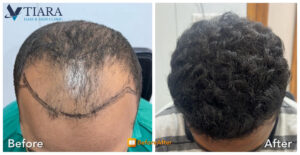Dandruff is a common scalp condition that affects people of all ages. Characterized by the presence of white or yellow flakes on the scalp and in the hair, dandruff can be both embarrassing and uncomfortable.
While it is not a serious medical condition, it can significantly impact one’s confidence and quality of life. In this blog post, we will delve into the causes of dandruff, explore effective prevention strategies, and discuss when it’s time to seek professional consultation for a healthier scalp.
What is Dandruff?
Dandruff is the result of the accelerated shedding of dead skin cells from the scalp. While shedding skin cells is a normal part of the scalp’s renewal process, dandruff occurs when this process is heightened.
The white or yellow flakes associated with dandruff are often accompanied by itching and redness, further contributing to discomfort.
Causes of Dandruff:
- Malassezia Fungus: One of the primary causes of dandruff is the presence of a yeast-like fungus called Malassezia on the scalp. This fungus feeds on the natural oils produced by the hair follicles and, in some individuals, triggers an inflammatory response that leads to excessive shedding of skin cells.
- Dry Skin: Individuals with dry skin are more prone to dandruff. When the scalp lacks sufficient moisture, it can become dry and flaky, resulting in the shedding of dead skin cells that form dandruff.
- Seborrheic Dermatitis: Seborrheic dermatitis is a chronic skin condition that can affect the scalp, causing redness, inflammation, and stubborn dandruff. It is thought to be linked to an overproduction of oil and an inflammatory response to the Malassezia fungus.
- Not Shampooing Enough: Irregular or inadequate shampooing can lead to the accumulation of oils and dead skin cells on the scalp, providing a conducive environment for the Malassezia fungus to thrive and cause dandruff.
- Certain Hair Products: The use of hair care products that contain harsh chemicals or allergens can irritate the scalp and contribute to dandruff. It’s essential to choose products that are suitable for your scalp type and avoid excessive use of styling products.
Preventing Dandruff:
- Regular Shampooing: One of the most effective ways to prevent dandruff is to maintain good scalp hygiene by regularly shampooing your hair. Use a mild, anti-dandruff shampoo that contains ingredients like zinc pyrithione, ketoconazole, or selenium sulfide.
- Moisturize the Scalp: For individuals with dry skin, keeping the scalp moisturized is crucial. Use a moisturizing conditioner and, if necessary, apply a light, non-greasy oil to the scalp to prevent dryness.
- Balanced Diet: A healthy diet plays a significant role in overall skin health, including the scalp. Ensure that your diet includes essential nutrients like vitamins A, B, and E, as well as zinc and omega-3 fatty acids. These nutrients support a healthy scalp and can help prevent dandruff.
- Manage Stress: Stress can exacerbate dandruff symptoms. Practice stress-management techniques such as meditation, yoga, or deep breathing exercises to promote overall well-being and a healthy scalp.
- Limit the Use of Hair Products: Be mindful of the hair care products you use. Choose products that are gentle on the scalp and free from harsh chemicals. Avoid excessive use of styling products, as they can contribute to product buildup and dandruff.
When to Seek Professional Consultation:
While mild dandruff can often be managed with over-the-counter shampoos and lifestyle adjustments, persistent or severe cases may require professional intervention. Consider seeking consultation from a dermatologist or healthcare provider if:
Over-the-Counter Products Are Ineffective: If your dandruff persists despite using over-the-counter anti-dandruff shampoos for several weeks, it’s time to consult a professional. They can recommend stronger prescription-strength shampoos or medications.
Severe Itching and Redness: Intense itching and redness of the scalp may indicate a more serious condition, such as seborrheic dermatitis or psoriasis. A dermatologist can provide a proper diagnosis and recommend appropriate treatment.
Scalp Irritation Persists: If you experience persistent scalp irritation, inflammation, or if your dandruff is accompanied by other symptoms, such as hair loss, it’s essential to consult a healthcare professional for a thorough examination.
Changes in Hair Texture or Color: Any noticeable changes in the texture or color of your hair, especially if accompanied by dandruff, should be examined by a dermatologist. This could be indicative of an underlying scalp condition that requires attention.
Conclusion:
Dandruff is a common scalp condition that, while not harmful, can impact one’s quality of life. Understanding the causes of dandruff and implementing effective prevention strategies are crucial steps in maintaining a healthy scalp.
For persistent or severe cases, seeking consultation from a dermatologist or healthcare provider is essential for a proper diagnosis and tailored treatment plan.
By taking proactive steps and addressing dandruff early on, individuals can enjoy a healthier scalp and improved overall well-being.




